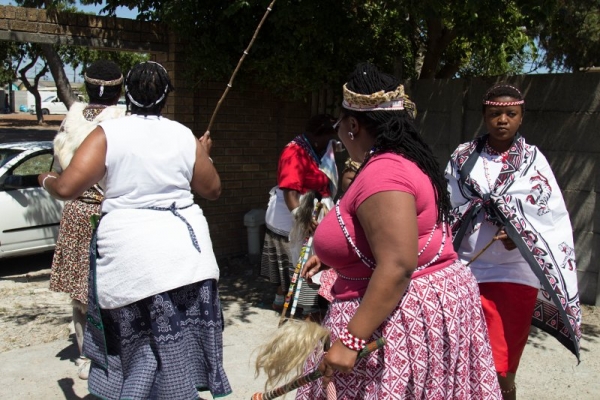I’m a lesbian sangoma from Nyanga

I was raised in a township that is known for its murders, rapes, hate crimes and robberies. Nyanga molded me with a strong personality, but has left me with challenges that will forever be rubbed in my face by those who see my sexuality as satanic.
I am a sangoma initiate. I am also lesbian. To some people I don’t make sense. According to some traditional leaders, being lesbian is satanic and my ancestors’ spirits will never live in my satanic body. Another prejudice I face is that I am a snob because besides being a black lesbian, I have embraced evil western culture and live a life that is not appropriate for a Nyanga girl.
As with most women born in most townships, many people assume what my life should look like. They expect me to have two kids, perhaps work at a retail shop, if I’m fortunate enough to get a job, and be in and out of relationships with men. To them I’m abnormal. I have no kids. I date women. And I went to university, which is considered snobbish by many people.
Because I was afraid of discrimination from my community and family I lived outside of Nyanga during my university years. I did not feel free there. I had not told the elders in my family about my lesbianism because I was afraid of the way they might respond to me.
But due to my sangoma calling I have moved back to Nyanga and now have to face the challenges I ran away from a few years ago.
For a long time I had to explain to people why I am a lesbian, and that drained me. I had to say countless times that I am not against men, and that I am not a man; I am still a woman. Now I have to explain that a lesbian can still be a sangoma and, no, that doesn’t mean my sangoma spirit is a man.
Last week I did my sangoma ceremony. A community elder known as Bra-K who lives not far from my house said that he is glad that I am a sangoma and that now I will stop fooling with girls. He said that now I need a good man to teach me womanhood. Another man said that he knew that I was evil because being a sangoma promotes witchcraft, and the fact that I am black and lesbian makes it clear that I have evil spirits.
I was sad and worried. These prejudices came to the fore in a discussion by a group of young men who believed that Nyanga is becoming more cursed because there are people like me.
Nyanga and many other townships suffer from lack of knowledge, education and acceptance. Yet these days many young people in townships are coming out of the closet regardless of the discrimination they experience. Some of them, like me, have a calling to be a sangoma, and they experience additional stigma. It’s going to be tough educating people about being a sangoma and a lesbian at the same time.
When I decided to came out of the closet and be an open and happy lesbian, I didn’t go door-to-door to tell people in my neighborhood. But I suppose my style, dresscode, friends and interests actually spoke on my behalf.
Three years ago a man that I have known most of my life said to me he wanted to show me what it feels like to be a ‘township girl’. The way he held my hand showed me what he meant by this. I managed to pull away from him, but I realised that I was not accepted for who I am by my own people. To make matters worse, I am constantly told that I am a snob because I speak English more than Xhosa and I went to university.
Many people in Nyanga believe they were not born to further their education. Instead if someone gets to grade 12 then that’s the greatest.
If Nyanga is to change, to become a safer, better place to live, then these attitudes have to change. People have to embrace the need for better and more education. They also have to accept diversity, that there are many different ways of living your life. Lesbians in Nyanga should feel free and not suffer for having a different sexuality from the norm.
Sefali is a GroundUp reporter. Opinions expressed are not necessarily GroundUp’s.
Next: Global campaign to make corporations more accountable
Previous: Why selection of next Concourt judge is a big deal

This article is licensed under a Creative Commons Attribution-NoDerivatives 4.0 International License.


